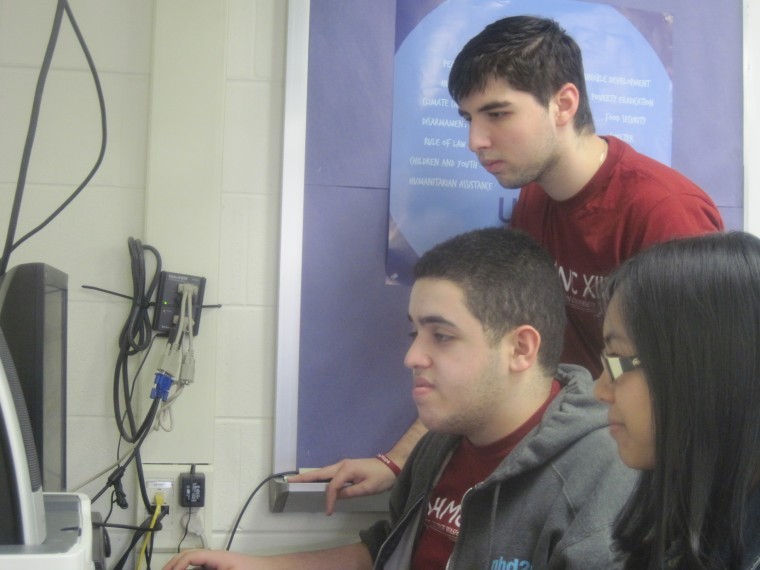They haven’t quite sorted out a lasting Middle East solution yet, but students in the Model United Nations elective course at Herricks High School attempt to do just what their counterparts in the real international organization do: debate issues of global importance to come up with viable solutions.
And as they acquire diplomatic skills and become more articulate, some are focusing on international affairs in college and considering careers in the field.
The course aims at building their skills in researching and presenting arguments on these issues, whether they agree with the side they’re representing or not.
“They get better the more they do it. It’s a like a debating class,” said Chloe Graef, the Herricks High School social studies teacher who developed the program and oversees the class. “They represent countries, so when they debate, they represent that country’s position.”
The open elective, available to Herricks High sophomores, juniors and seniors, is intended to teach them about international relations, the world economy, and international resources development and ecological issues, according to Graef.
The Model U.N., Graef said, is intended to hone students’ sensibilities about vital world issues.
They also attend conferences – most recently at George Washington University in Washington, D.C. Graef said the combination of classroom preparation and the experience of debating issues with students from high schools from other states and other countries has a marked affect on these students and how they approach their faux United Nations assignments.
Next month, Herricks is looking to hold its own U.N. conference and has invited “delegates” from several other high schools to attend the May 28 summit.
Herricks senior Dan Cohanperu, who’s attended nine conferences in three years, said he’s seen growing maturity among his peers.
“In the beginning of high school, we were yelling at people. But we’ve grown as negotiators and debaters,” Cohanperu said. “When we debate. wer’re always sensitive to each others’ sensibilities
In some cases, the students portray real diplomats in historical circumstances. Cohanperu represented one of the Shah of Iran’s Imperial Guards in a meeting wih the Ayatollah Khoumeini’s representatives supposed to be taking place as the governmental transition was occurring there. Ironically, Cohanperu’s parents had lived in Iran and fled the country when the Shah’s rule fell. But as Jewish citizens of the country, he said his parents felt the Shah protected them.
“They would have been upset if I represented someone from Khoumeini,” he said.
“It’s an interesting aspect and sometimes you have to represent historical persons with opinions you don’t agree with,” said senior Camille Serrano.
Both students are leaning toward studying foreign relations in college.
The students also create fantasy negotiations, from a five-Mafia families sit-down to a negotiation based on George Orwell’s dark futuristic view of a world ruled by fascism in “1984.”
“It’s like a real parallel of real life,” said sophomore Keri DiBattistista
In one recent case, senior Blake Goodman managed to reverse history and negotiate favorable terms for Persia in its war with the Greek city-states.
“We as a group conquered the Greeks and we expanded the Persian Empire,” he said.
But apart from playing out fantasy negotiation scenarios, the Herricks students are learning how the real world works.
“The most important thing to me was stuff that actually matters in the world,” said junior Alex Leplaza.
Students said the public speaking experience also helps their self-esteem.
“It helps you to learn more about the world and you gain self-esteem too,” said junior Ali Khan.
Graef said she has witnessed gratifying evidence of that kind of impact over the six years she’s been teaching the course at Herricks High.
‘”I’ve had students who never spoke in class and when they come back from conferences, they’ve changed,” she said.
Typically, students are afforded opportunities to attend three Model U.N. student conferences three times annually, this year at Browne University, Columbia University and George Washington.
Each conference typically has 1,000 students in attendance with 10 to 20 committees set up for different purposes. The students typically put in four days of negotiating in their portion of the proceedings in days that can exceed 12 hours each day – with periodic breaks – over four days.
Graef herself learned to think on her feet through the Model U.N. in high school and in college at Bristol University in the UK.
“I think of the U.N. as a type of improv,” she said. “I felt it was a good fit in Herricks because of the multi-ethnic population in the district.”
So far, it seems like it is, indeed, a good fit, with many Herricks alumni have attended George Washington to study international relations, as one Herricks graduate is currently doing at the University of Michigan.
“It seems like something that has an elitist motivation, but it doesn’t. You’re cool for knowing something,” Graef said.



